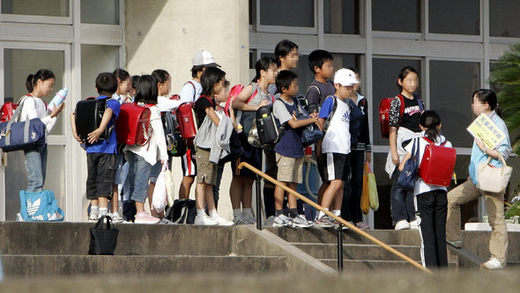 |
|
A group of students attending a school set up by a pro-Pyongyang citizens’ organization in Japan listens to their teacher before being dismissed.
|
Following North’s test, fear of bombings, violence
A Japanese citizen telephoned a Korean school in Chiba, Japan, on October 13, threatening to blow it up. Since North Korea claimed it had conducted a nuclear test on October 9, schools affiliated with Chongryon, or the pro-Pyongyang General Association of Korean Residents in Japan, have received many threatening calls. There were unconfirmed reports of a female student getting her clothing slashed by a knife-wielding assailant, but no direct violence has been seen so far. Police have stepped up their patrol efforts around these schools. O Baek-geun, the principal of the school in Chiba - which is one of those affiliated with the pro-Pyongyang organization - said that the threats leveled at his school started before the North’s nuclear test. "Since the Japanese government announced that the remains said to be Yokota Megumi’s, returned by North Korea in 2004, were false, the "minjok" [Chongryon-affiliated] schools have suffered ceaseless threats and malfeasance." Yokota was kidnapped by North Korean agents from Japan in the 1970s. The North said she died of natural causes and returned her ashes to Japan, but DNA tests said they were the remains of several unrelated individuals.To prevent his school’s students from becoming targets of terror by Japanese right-wing extremists, O said, the school has allowed them not to wear their Korean style uniforms. A Korean school in Hokkaido got a number of telephone calls on October 9-10, with callers threatening that they would kill the students. As a result, the school has let its students wear street clothing instead of their uniforms, and many parents accompany their children to school in the morning. After the Megumi Yokota incident, there has been widespread antipathy in Japan for people whose nationality is known here as "Joseon," which was the name of the last dynasty of self-ruled, unified Korea. Displaced during the Japanese colonial period, these ethnic Koreans were in Japan at the close of the Korean War, but some chose not to become citizens of either North or South Korea. These "Joseon" people are nationless, with Japan accepting neither these people nor their families as citizens. Novelist Lee Hoi-seong, 71, who became the first foreigner to receive the Akutagawa Prize, Japan’s top literary award, said that "due to the North’s nuclear weapons test, Korean residents in Japan are in trouble." Lee placed the blame on the United States for "maintaining and even bolstering" the forces which had brought about "aggressive wars of invasion, such as World War II." A reduction in the number of pupils and discrimination from Japanese society have led a sharp decrease of schools affiliated with Chongryon, from 140 of such schools in 2003 to about 80 currently. In Japan, there are also "Hanguk (Korea)" schools, which were established by Mindan, a pro-Seoul Korean Residents Union in Japan.





